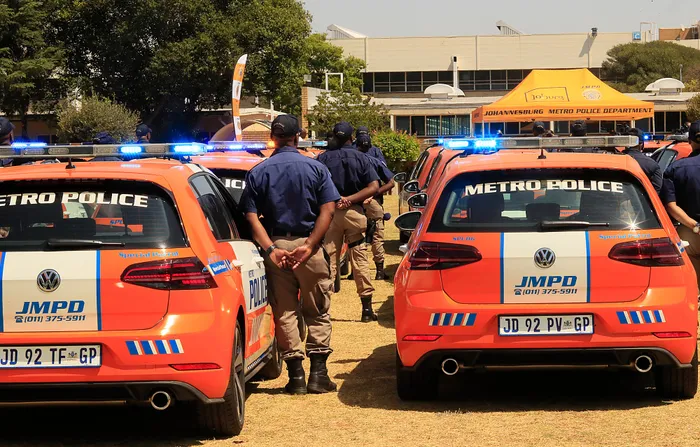Criticism of JMPD's focus on revenue generation through fines

The Johannesburg Metro Police Department is facing criticism over its decision to set quotas of R7,000 in fines a day or 10, which it denies.
Image: Simphiwe Mbokazi / Independent Newspapers
The SA Municipal Workers’ Union (Samwu) has accused the Johannesburg Metropolitan Police Department (JMPD) of focusing more on generating revenue than enforcing traffic laws and dealing with road infringements.
Samwu’s reaction follows the DA’s allegations that JMPD officers informed the party that they are under pressure to each collect at least R7,000 in traffic fines daily.
DA City of Johannesburg councillor and former member of the mayoral committee for public safety, Michael Sun, said to incentivise compliance with the set targets, officers were being provided with overtime payments, which effectively transformed law enforcement into a commission-based revenue scheme.
“This pushes JMPD officers to aggressively pursue fines instead of focusing on their duties, such as by-law enforcement, traffic management, and crime prevention,” he said.
According to Sun, the revelations were disturbing and coincide with the common sight in Johannesburg, where the JMPD is increasingly engaging in indiscriminate and excessive roadblocks, particularly at high-traffic intersections, not to ensure road safety or enforce the law but to maximise fine collection.
“Many of these operations are non-compliant with the National Road Traffic Act and the SA Police Service standing orders. By reclassifying illegal roadblocks as 'roadside checks', JMPD evades crucial legal requirements, including proper authorisation by a senior officer, clear signage and adequate warning to motorists, among others,” he explained.
Samwu Johannesburg deputy regional chairperson Lebogang Ndawo said this was unfortunately the direction of the JMPD, which is either disguised as a performance management system where officers are told to issue a minimum of 10 tickets or is done when private companies are involved.
He said the private companies get a share of every speeding violation that is captured, or through payments made at roadblocks, in which they get a percentage.
“Now what is happening is that because these companies are profit-oriented, for example, they will look into setting up speed camera traps in revenue-generating zones rather than dangerous zones or those with high accident rates,” Ndawo said.
Like Sun, he added that this led to the setting up of speed cameras not being mainly focused on deterring drivers, but to try and trap them so that there is more money made as a result.
“Roadblocks are primarily focused on payment of fines, other than to perform law enforcement, crime prevention, and traffic law enforcement, but instead it’s just focused on payment of traffic fines,” he said.
He said this was a result of a department suffering from political interference and managers who have forgotten its vision and mission.
Samwu called for reforms and for the municipality to put service over profit as well as safety over quotas, according to Ndawo.
“That is the only way JMPD must function, JMPD must continue to protect and serve the residents of Johannesburg and not be converted into a profit-making company,” he urged.
The JMPD has denied the existence of the targets or any quota system.
Spokesperson Xolani Fihla: “The JMPD has been made aware of the allegations made by the DA. We would like to emphasise that our enforcement operations are conducted with the primary goal of maintaining safety and order on the city’s roads.”
He said that while officers are expected to issue citations when motorists violate traffic laws, doing so serves as a necessary corrective measure to address lawlessness, curb unsafe behaviour, and promote a culture of responsibility among all road users.
Fihla continued: “It is important to clarify that while issuing citations is an expected part of an officer's duty to enforce traffic regulations, there is no quota system that they are expected to follow.”
He said the JMPD's focus is on ensuring compliance with traffic laws to prevent accidents and protect the lives of all road users not on generating a specific number of fines.
“The performance of our officers is measured by their overall effectiveness in creating a safer environment for the community, and one of the ways is to issue citations, not by a predetermined target for fines. The integrity of our operations is paramount, and all actions are taken in strict accordance with the law,” said Fihla.
loyiso.sidimba@inl.co.za